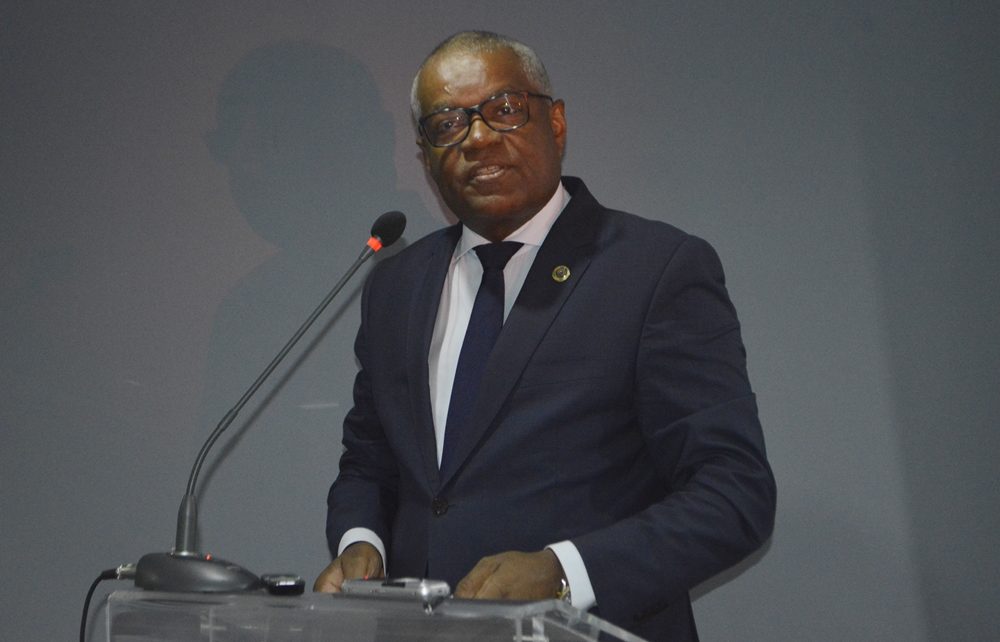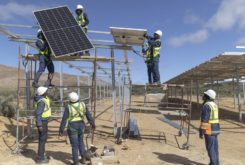Health is at the heart of the Santos family, one of Cabo Verde’s most influential, whose most prominent member is Jorge Santos, the president of parliament and a key figure inside the liberal Movement for Democracy (MpD) party, which holds a parliamentary majority and supports the current president. With multiple privatisations unfolding, the Santos are expected to further bolster their standing in the health sector.
With Jorge Pedro Mauricio dos Santos (born 1962), a former president of the National Association of Municipalities of Cape Verde (ANMCV) and high ranking member of the OECV (Order of Engineers of Cabo Verde), directly involved in politics in the National Assembly and MpD party (leader, 2006–2010), another family member, António Mauricio Santos, is now the main agent in the family business, according to our sources.
Secretary of state for Transport in the 1990s in the government of Carlos Veiga, António Mauricio Santos was the campaign director for the MpD in the 2016 elections legislative elections that led Ulisses Correia e Silva to power.
His sisters also have interests in the health business: Helena Santos, a pharmaceutical manager in the city of Praia, and Edite Santos, a board member at Inpharma (40 per cent held by Emprofac) – and, until 2016, board member at state-owned pharmaceutical company Emprofac, which is about to be privatised.
Their common origins in the island of Santo Antão, more specifically in the city of Ribeira Grande, also connect the Santos family to Minister of Health Arlindo Nascimento do Rosário, a fact that is also considered advantageous in the current context of privatisation.
The Santos family’s interest in Emprofac is well established, at least since the first announcement of privatisation, made in the late 1990s, by then-Deputy Prime Minister Gualberto do Rosário.
With the re-launch of privatisations after the electoral victory of the MpD in 2016, the Santos family was quick to take position as one of the main interested in buying the company. To this end, it created a company called Sodifarma, in which it wanted to combine the main pharmacies in the country.
An amount of CVE3 million (US$30,548) was requested from each of the pharmacies to constitute the share capital of Sodifarma. But the intention to involve most pharmacies in this society failed and the Santos family companies ended up underwriting most of the stock.
After the establishment of Sodifarma, the government was requested to authorise imports of medicines by the company, but this was rejected in order to avoid competition for Emprofac, which has a monopoly on the activity. The possible opening up of the market for pharmaceutical products is seen as unfeasible given the small size and insularity of the country.
But the Santos family will have to fight for the pharmaceutical trading monopoly, according to our sources. Portuguese pharmaceutical company Mercafar, SA has also expressed interest in the privatisation of Emprofac. It has collaborated with Emprofac since 2008, providing consultancy and training services in the technical, information systems, sales and logistics sectors, and more recently supported the opening of the company’s new warehouse in Praia and the training of employees in the distribution area.
Mercafar, SA belongs to the Cooprofar-Medlog Group, a holding company of Cooprofar-Cooperativa dos Proprietários de Farmácia, CRL, the largest Portuguese cooperative, which supplies more than 1,000 pharmacies throughout Portugal and had a consolidated turnover in excess of EUR375 million (US$421.26 million) in 2017.
Whoever acquires Emprofac will also have a privileged position in Inpharma (40 per cent), which produces 35 per cent of the medicines used in the country. It aims to hit 50 per cent – and possibly internationalisation – with the completion of a new US$6.74-million plant, expected in the second half of 2020, and a second facility, set to begin construction in 2021.
The government of Ulisses Correia e Silva imposed, with the support of international partners, an agenda of economic liberalisation, in which the withdrawal of the state from companies, in most cases heavily indebted, to be completed by 2021, is of particular importance. In the 15 years of PAICV governance (2001–2016), no public company was privatised.
In addition to Emprofac, Silva’s executive intends to sell or lease companies related to telecommunications (NOSi and CVTelecom), ports (ENAPOR), airports (ASA, AM 1999), real estate (IFH), shipyards (CABNAVE), postal services (Carroeios de Cabo Verde), insurance (Promotora) and hospitality (EHTCV).
The process of privatising TACV International, a carrier already under management of Icelandair, and the concession of inter-island transport, has already been completed.
The Santos are not alone; various other families close to MpD have been ascending to positions of power in the state and public companies.
The distribution by PM Ulisses Correia e Silva, to former colleagues and personal friends, of positions in the central administration and public companies created malaise within circles of the MpD close to Carlos Veiga, former PM and current ambassador in Washington. Humberto Cardoso, former member of parliament and former leader of the party, is among those who expressed displeasure more vehemently.
In the distribution of positions, the highlight is the importance assumed by the Fernandes and Silva families. Former Ulisses Correia e Silva neighbours in the Platô neighbourhood, the historic city centre of Praia where Silva grew up, four brothers of the Fernandes family were named to senior positions in the state: António Fernandes, CEO of NOSi; José Augusto Fernandes, president of the Executive Committee of the National Institute of Social Security (INPS); Albertino Fernandes, CEO of FICASE (Cabo Verdean Foundation for School Social Action); Fátima Fernandes, administrator of the IE (Institute of Roads).
From the Silva family, who share some degree of kinship with the prime minister, were named Eunice Silva, minister of Infrastructure, Planning and Housing; Luís Silva, MpD member of parliament; and Mayra Silva, principal manager of the Citizen’s House.
Among the group of personal friends of Ulisses Correia e Silva are Guevara Cruz, computer technician, appointed national director of Public Administration, and Carlos Santos, appointed executive director of NOSi, after several years as the right-hand man of then-PM José Maria Neves (JMN) in the state reform unit.
Another ‘lobby’ promoted by Silva is that of former high school classmates (known as ‘class A’). Of the group, which still meets in the city of Praia with the presence of Silva, several names have been put forward and now hold important positions in the administration of the state, such as the diplomat Maria de Jesus Mascarenhas, Alexandre Monteiro (CEO of Electra) and Gil Évora (CEO of Emprofac).




